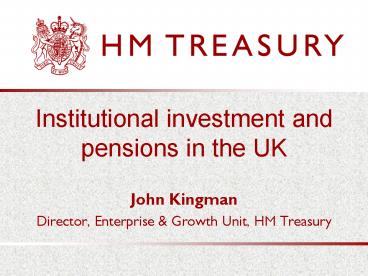Institutional investment and pensions in the UK - PowerPoint PPT Presentation
1 / 17
Title:
Institutional investment and pensions in the UK
Description:
Institutional investment and pensions in the UK. John Kingman ... UK pensions the context. High level of private provision by international standards ... – PowerPoint PPT presentation
Number of Views:32
Avg rating:3.0/5.0
Title: Institutional investment and pensions in the UK
1
Institutional investment and pensions in the UK
- John Kingman
- Director, Enterprise Growth Unit, HM Treasury
2
- Background the UK pensions debate
- Investment issues Paul Myners review
3
UK pensions the context
- High level of private provision by international
standards - Sustainable burden on taxpayer
- but
- Growing concerns about undersaving
- Life expectancy rising stock market falling
- Impact of new accounting standards (FRS 17)
- Many defined-benefit schemes being closed to new
entrants - Personal pensions legacy of mis-selling
- Limited take-up of stakeholder pensions
- Some debate over compulsion
4
Sandler review of retail savings market
- Competitive forces do not always work
effectively to deliver value - Weak consumers
- Heavy reliance on commission-based intermediaries
- Weak pressures on efficiency, productivity and
business performance - Heavy costs of regulation
- obscure differences in tax treatment
- uneconomic for industry to serve lower-income
consumers
5
2002 Pensions Green Paper - analysis
- Around 3m people seriously underproviding for
their retirement - Perhaps 5-10m people may also want to consider
saving more or working longer
6
2002 Pensions Green Paper - proposals
- Implementation of Sandler proposals
- plus
- Radical tax simplification
- Mass pensions forecasts
- Abolition of minimum funding requirement new
regulator - Tax changes to encourage flexibility retirement
- Simplifying pensions legislation
- Help for employers
- Public sector pensions payable at 65, not 60, for
new members - plus..
- Independent pensions commission to report
regularly on how effectively the current
voluntarist approach is developing over time and
on whether there is a case for moving beyond the
current voluntarist approach
7
Investment issues the Myners review (2001)
- Stock, not flow more than 1.5 bn of assets
- Institutional investors own and control most of
British industry
8
Why a review? some clues
- Very striking similarities in asset allocation
- Curiously low investment in private equity
- Debate on short-termism
9
The investment chain
Investment consultants
Trustees
Fund Managers
Brokers
Companies
At the heart of the review is the belief that
clearer incentives and tougher customer pressures
need to be driven throughout the savings and
investment industry
10
Myners analysis I - trustees
- 62 of trustees have no professional
qualifications in finance or investment - 77 of trustees have no in-house professionals to
assist them - gt50 had less than 3 days training
- Almost all unpaid
11
Myners analysis II investment consultants
(advisers)
- Very small group of providers
- Strong actuarial background less strong
investment expertise, eg in new asset classes - Lack of clarity over responsibility no one has
a clear mandate trustees feel they lack
expertise, advisers lack power to make decisions
result can easily be inertia - Example of private equity trustees say not
raised by advisers advisers say trustees not
interested
12
Myners analysis III asset allocation
- Academic studies suggest asset allocation plays
crucial role in determining investment outcomes - But who is doing it?
- Very low level of resources devoted to asset
allocation, compared to other costs and very
small groups of providers - Use of peer group benchmarks
- asset allocation driven by historic consensus
- Use of customised benchmarks
- Use of asset-liability modelling
13
Myners analysis IV other issues about
objectives benchmarks
- Ad valorem fees asymmetry of risk/reward
- Tight tracking error limits
- Lack of clarity on timescales if clients are
as at present extremely vague about the time
horizons over which performance will be judged,
managers will, perfectly rationally, assume they
could be removed after any quarters performance
14
Myners analysis V - activism
- Concerns about the management and strategy of
major companies can persist for long periods of
time before action is taken - not our job
- already doing it in private
- just sell the shares
- dont want to be insiders
- Some more likely explanations
- Activism takes time to pay off
- culture in financial community of waiting to
avoid public confrontation and conflicts of
interest - The underweight problem
15
Myners analysis VI broking costs
- Soft commissions
- Costs of research
- Symptom of broader problem of weak customer
16
Response to the Myners analysis
- Myners principles followed by 2 year review
- Legislation on trustees expertise
- Institutional shareholders committee code on
activism - Radical FSA proposals on broking costs
- Abolition of Minimum Funding Requirement
17
Some concluding issues
- Very difficult time to be running reform agenda
- Problem of customer fundamental to both Myners
and Sandler, ie whether institutional or retail - Pensions framework has broader economic
implications































